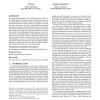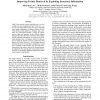18 search results - page 2 / 4 » Inferring user intent in web search by exploiting social ann... |
WWW
2009
ACM
14 years 10 months ago
2009
ACM
Both search engine click-through log and social annotation have been utilized as user feedback for search result re-ranking. However, to our best knowledge, no previous study has ...
SIGIR
2010
ACM
14 years 1 months ago
2010
ACM
An improved understanding of the relationship between search intent, result quality, and searcher behavior is crucial for improving the effectiveness of web search. While recent p...
UMUAI
2008
13 years 9 months ago
2008
This paper aims to demonstrate that the principles of adaptation and user modeling, especially social annotation, can be integrated fruitfully with those of the Web 2.0 paradigm a...
AAAI
2012
11 years 11 months ago
2012
Most Twitter search systems generally treat a tweet as a plain text when modeling relevance. However, a series of conventions allows users to tweet in structural ways using combin...
WWW
2008
ACM
14 years 10 months ago
2008
ACM
Folksonomies have shown interesting potential for improving information discovery and exploration. Recent folksonomy systems investigate on the use of tag assignments, which combi...


